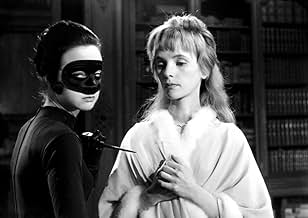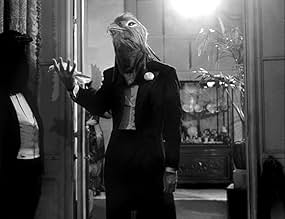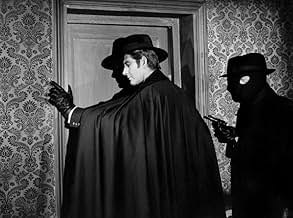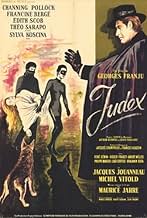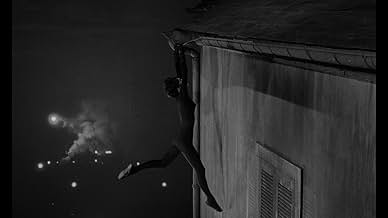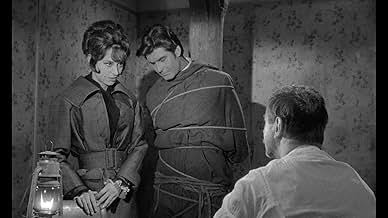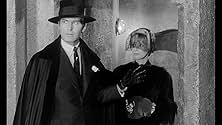Judex
- 1963
- Tous publics
- 1h 38min
NOTE IMDb
7,0/10
3,1 k
MA NOTE
Favraux, un banquier sans scrupules, reçoit une menace signée par "Judex," lui demandant de rembourser les personnes qu'il a escroquées. Il refuse et disparaît lors de son bal masqué, drogué... Tout lireFavraux, un banquier sans scrupules, reçoit une menace signée par "Judex," lui demandant de rembourser les personnes qu'il a escroquées. Il refuse et disparaît lors de son bal masqué, drogué et enfermé par Judex.Favraux, un banquier sans scrupules, reçoit une menace signée par "Judex," lui demandant de rembourser les personnes qu'il a escroquées. Il refuse et disparaît lors de son bal masqué, drogué et enfermé par Judex.
- Réalisation
- Scénario
- Casting principal
Avis à la une
Judex "1963 redux" has been produced as a homage to Louis Feuillade's original serial. The production values are very much aligned with that endeavour, so you can't blame Franju's work for a shortage of faithfulness, let alone dissecting it to pinpoint some lack of respect or understanding of the source material.
The point is the movie works as a homage, and then what? You can't tell a story in 1963 the same way it was told in 1916. At the time there was a developing medium, silent and with static setups, yet a medium Feuillade helped transition away from the filmed stage by making it closer to the action-packed serial pulp fictions.
So Franju adds nothing. This would be OK if it was the first shot at features from a naive cinema student, but here lacks something closer to a real movie, a movie with its own rhythm, its own structure and real suspenseful action not silent action designed to fit a frame.
It is true that Franju was more interested in remaking Fantomas. How would he have succeeded in doing this any better, i.e. matching the original popular success of fascination for a frightful villain? That takes much more work than a nice little artsy homage to the movies of yore.
The point is the movie works as a homage, and then what? You can't tell a story in 1963 the same way it was told in 1916. At the time there was a developing medium, silent and with static setups, yet a medium Feuillade helped transition away from the filmed stage by making it closer to the action-packed serial pulp fictions.
So Franju adds nothing. This would be OK if it was the first shot at features from a naive cinema student, but here lacks something closer to a real movie, a movie with its own rhythm, its own structure and real suspenseful action not silent action designed to fit a frame.
It is true that Franju was more interested in remaking Fantomas. How would he have succeeded in doing this any better, i.e. matching the original popular success of fascination for a frightful villain? That takes much more work than a nice little artsy homage to the movies of yore.
I never had the opportunity to catch up with this one during my childhood and, for a long time, I had to make do with an intriguing still of the lead character in a large bird mask and holding what appears to be a dead dove. Three years ago, I managed to get hold of a VHS copy duped from what, reportedly, is the only French-language version (an extremely fuzzy 16mm print with barely-legible English subtitles) in existence! Its dire condition had affected my initial judgment and I didn't enjoy the film as much as I hoped I would. Then, two years later, Flicker Alley released the original 12-episode Silent serial of 1916-17 by Louis Feuillade (whose length totals over 5 hours) and I decided to try the Franju film again as a companion piece; this time, I was determined to overlook the deficiencies of the print and just go along for the ride - and, sure enough, it proved to be a much more rewarding experience! This third viewing, then, came by way of an Italian-dubbed 'variant' I recorded off TV which is in much better shape and, despite being apparently trimmed (95 mins. against the official 104), I opted to keep it as the former is a real chore to sit through!
Anyway, much as I admired the already wonderful Feuillade version (which, for the record, I also rate ***1/2), I found the later film - to my mind, an immensely satisfying compression of it - to be even superior because of its genuine touches of poetry and magic, even surrealism (such as the afore-mentioned costume party scene in which Judex - already hiding his true identity under an alias and his features behind layers of make-up - turns up donning a symbolic pigeon mask). In fact, the title role is played by real-life magician Channing Pollock which allows his celebrated act to be cleverly incorporated into the narrative!
I would venture to say that Franju's JUDEX is one of the best remakes ever made - fascinating, exciting and imaginative. The timing of its release (coming immediately prior to the espionage boom of the 1960s) ensured that the film also be viewed as a fond farewell to the days of old-fashioned crime (though gadgetry - soon to go overboard, i.e. when the James Bond extravaganzas descended to the level of a comic-strip - is still present, such as the mirror which allows Judex to peek at his captive and even communicate with him by writing on the glass panel itself).
For all his limitations as an actor, Pollock displays all the stoicism of the typical superhero and carries a genuine screen presence. Besides, Francine Berge' has to be one of the most captivating villainesses to ever grace the screen - utilizing several disguises in the realization of her evil schemes, none more fetching than the skin-tight black outfit (which she also sports when engaging in the climactic roof-top fight with an equestrienne, played by Sylva Koscina in a splendid cameo). Franju regular Edith Scob, then, is the doe-eyed heroine and there's also amiable support from the characters of the detective Cocantin and a resourceful boy who eventually becomes his sidekick. Another of the film's major assets is a subtly haunting score from Maurice Jarre (the last of eight collaborations with Franju, among them the latter's masterwork EYES WITHOUT A FACE [1960]).
The film - co-written by Jacques Champreux (grandson of Louis Feuillade!) and produced by Robert De Nesle (later associated with the dubious work of Jess Franco!) - is a veritable connoisseur's treat and a sheer delight from beginning to end. Franju later made the similar SHADOWMAN (1974; in which Champreux himself took the lead role!) but, by this time, such escapist fare was strictly old hat and, in any case, the result only worked in fits and starts. Another film in the same vein - which I own on VHS and I've been meaning to catch up with for some time - is the Russian-made 4½ hour Silent serial, MISS MEND (1926).
Anyway, much as I admired the already wonderful Feuillade version (which, for the record, I also rate ***1/2), I found the later film - to my mind, an immensely satisfying compression of it - to be even superior because of its genuine touches of poetry and magic, even surrealism (such as the afore-mentioned costume party scene in which Judex - already hiding his true identity under an alias and his features behind layers of make-up - turns up donning a symbolic pigeon mask). In fact, the title role is played by real-life magician Channing Pollock which allows his celebrated act to be cleverly incorporated into the narrative!
I would venture to say that Franju's JUDEX is one of the best remakes ever made - fascinating, exciting and imaginative. The timing of its release (coming immediately prior to the espionage boom of the 1960s) ensured that the film also be viewed as a fond farewell to the days of old-fashioned crime (though gadgetry - soon to go overboard, i.e. when the James Bond extravaganzas descended to the level of a comic-strip - is still present, such as the mirror which allows Judex to peek at his captive and even communicate with him by writing on the glass panel itself).
For all his limitations as an actor, Pollock displays all the stoicism of the typical superhero and carries a genuine screen presence. Besides, Francine Berge' has to be one of the most captivating villainesses to ever grace the screen - utilizing several disguises in the realization of her evil schemes, none more fetching than the skin-tight black outfit (which she also sports when engaging in the climactic roof-top fight with an equestrienne, played by Sylva Koscina in a splendid cameo). Franju regular Edith Scob, then, is the doe-eyed heroine and there's also amiable support from the characters of the detective Cocantin and a resourceful boy who eventually becomes his sidekick. Another of the film's major assets is a subtly haunting score from Maurice Jarre (the last of eight collaborations with Franju, among them the latter's masterwork EYES WITHOUT A FACE [1960]).
The film - co-written by Jacques Champreux (grandson of Louis Feuillade!) and produced by Robert De Nesle (later associated with the dubious work of Jess Franco!) - is a veritable connoisseur's treat and a sheer delight from beginning to end. Franju later made the similar SHADOWMAN (1974; in which Champreux himself took the lead role!) but, by this time, such escapist fare was strictly old hat and, in any case, the result only worked in fits and starts. Another film in the same vein - which I own on VHS and I've been meaning to catch up with for some time - is the Russian-made 4½ hour Silent serial, MISS MEND (1926).
The first "Judex" was made in 1916 and the late French critic Roger Boussinot was hard on Feuillade ,whose films were (I quote him) " brainwashing" .He was speaking of "Les Vampires" and "Judex" which ,for him,were hiding the atrocious reality.
Back in 1963,Franju,who had a penchant for mystery ("Les Yeux Sans Visages" "Pleins Feux sur l'Assassin" ) made a remake.He cast a conjurer(Channing Pollock) as the lead (which was not a bad idea after all for Judex being an almost surrealistic hero did not demand a great actor ) Franju used again his favorite actress ,Edith Scob,("les Yeux Sans Visage" ) whose eyes were the most beautiful (along with MIchèle Morgan's) in the French cinema.
Judex is some kind of mysterious Robin Hood,who comes to the rescue of poor people an unscrupulous banker has swindled . Franju's sense of mystery works wonder and creates a strange atmosphere with this hero with a bird mask .A sequence was filmed in Château-Gaillard ,les Andelys .
Back in 1963,Franju,who had a penchant for mystery ("Les Yeux Sans Visages" "Pleins Feux sur l'Assassin" ) made a remake.He cast a conjurer(Channing Pollock) as the lead (which was not a bad idea after all for Judex being an almost surrealistic hero did not demand a great actor ) Franju used again his favorite actress ,Edith Scob,("les Yeux Sans Visage" ) whose eyes were the most beautiful (along with MIchèle Morgan's) in the French cinema.
Judex is some kind of mysterious Robin Hood,who comes to the rescue of poor people an unscrupulous banker has swindled . Franju's sense of mystery works wonder and creates a strange atmosphere with this hero with a bird mask .A sequence was filmed in Château-Gaillard ,les Andelys .
French remake of a 1914 serial involving a "crime fighter" who uses masks and deception to right wrongs and such. Similar in someways to a more real batman. This remake has Judex-the Latin for judge- going after a banker who swindled people by telling him that if he didn't repay the money he would die. And die he does-or so it appears as Judex spirits the man away and hold him prisoner. From there it gets complicated. Good but unremarkable as a whole mystery/adventure story set in the late 1800's thats perfect for late night viewing since its the sort of thing I used to run across at 2am. Worth a look if you run across it but I don't know if I'd go out of my way to see it.
I have to agree with the review by Swanger2001. After the initial set up of the characters and the amazing Masked Ball scene, the film settles into boring dialogue and badly staged action.
I'm curious to hear what a French-speaking person thought of the acting. I don't speak it myself, but this one of the few times I've seen a French film and thought "this (acting) seems really lousy - like a low budget exploitation film".
I don't know if this film is available on DVD. I saw a VHS copy courtesy of Something Weird Video...and the subtitles left something to be desired. Film quality was mediocre.
Worth seeing if you liked "Eyes without a Face", but not essential viewing.
I'm curious to hear what a French-speaking person thought of the acting. I don't speak it myself, but this one of the few times I've seen a French film and thought "this (acting) seems really lousy - like a low budget exploitation film".
I don't know if this film is available on DVD. I saw a VHS copy courtesy of Something Weird Video...and the subtitles left something to be desired. Film quality was mediocre.
Worth seeing if you liked "Eyes without a Face", but not essential viewing.
Le saviez-vous
- AnecdotesAwarded the Coupe Jean-George Auriol 1963, by the jury's unanimous decision, in France.
- GaffesJust before Cocatin, the private detective, sits down at Favraux's desk, a moving shadow of the boom microphone is briefly visible on the curtains at the top of the frame.
- Citations
Alfred Cocantin: What's all this about nuns?
- ConnexionsFeatured in Cinéma, de notre temps: Georges Franju, le visionnaire (1996)
Meilleurs choix
Connectez-vous pour évaluer et suivre la liste de favoris afin de recevoir des recommandations personnalisées
- How long is Judex?Alimenté par Alexa
Détails
- Date de sortie
- Pays d’origine
- Langue
- Aussi connu sous le nom de
- Fantoma
- Lieux de tournage
- Château-Gaillard, Les Andelys, France(Judex's hideout)
- Sociétés de production
- Voir plus de crédits d'entreprise sur IMDbPro
- Durée1 heure 38 minutes
- Couleur
- Mixage
- Rapport de forme
- 1.66 : 1
Contribuer à cette page
Suggérer une modification ou ajouter du contenu manquant


